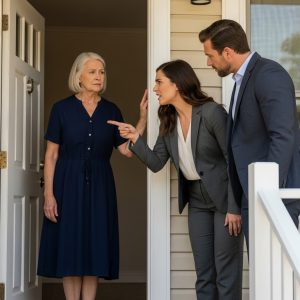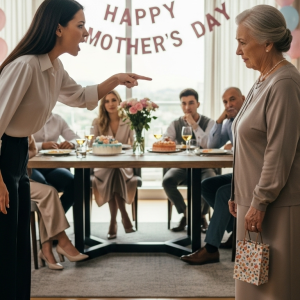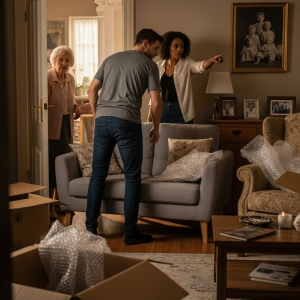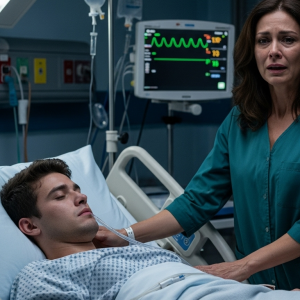The elegant notes of Pachelbel’s Canon floated through the air as I stepped into the grand ballroom of the Bellamy Hotel. At seventy, I had spent three hours getting ready for my granddaughter Elsie’s wedding, my arthritic fingers struggling with the pearl buttons on my pale blue dress.
My heart fluttered with anticipation. After months of minimal contact, I hoped this day would be a chance to bridge the growing distance between us. The wedding coordinator, a young woman with a tight smile, directed me to the reception desk.
“Name?” she asked, barely looking up from her tablet.
“Eleanor Walsh,” I replied, the pride in my voice unmistakable. “The grandmother of the bride.”
Her fingers tapped on the screen. “Right. Here’s your name tag.” She slid a small badge across the counter. I picked it up, expecting to see my name elegantly printed. Instead, scrawled in hasty handwriting were four simple words: “The absent old lady.”
My fingers trembled. “Surely this is a mistake,” I began, my voice suddenly dry.
“We’re quite busy, ma’am,” she interrupted, already looking past me. “The ceremony starts in twenty minutes. Please find your seat.”
I clutched the badge, a small piece of paper that felt heavier than anything I had carried in years. Across the room, I saw Elsie, radiant in her designer gown, laughing with her bridesmaids. I saw my son, James, his arm around his wife Sandra. No one looked my way.
I pinned the badge to my dress, each press of my fingers a quiet surrender. An usher guided me to a seat in the far back corner, hidden behind a large floral arrangement that blocked my view of the altar. I was invisible.
At the reception, my table assignment was equally telling: Table 19, the furthest from the bridal party, populated by distant acquaintances. The table card labeled it “Extended Connections.” I watched as James gave a speech filled with stories of Elsie’s childhood—stories I had lived, moments I had shaped. He never mentioned my name.
Later, I approached the bridal table, gift envelope in hand. Elsie saw me coming and whispered something to her new husband, Franklin. They both glanced at me before pointedly turning away.
“Elsie, darling,” I said, reaching them. “You look absolutely beautiful.”
“Oh, Grandma,” she said, her smile not reaching her eyes. “You made it.”
I extended the envelope. “A small gift for you both.”
“You can just leave it with the others,” she interrupted, gesturing to a massive pile of presents before turning her back to me.
As I placed my envelope among the expensive gifts, I noticed the wedding planner’s clipboard on a nearby chair. Under a section titled “Special Arrangements,” I read a line that made my blood run cold: “Eleanor Walsh: Isolated seating, minimal interaction, as requested by bride’s mother.”
The room suddenly spun. For years, I had made excuses for the missed calls, the forgotten birthdays, the abbreviated visits. I told myself they were just busy. But this was not neglect. This was deliberate. This was orchestrated cruelty.
In that moment, something inside me, something that had bent and bent for years without breaking, finally snapped.
I found a quiet corner near the coat check, a lifetime of memories crashing over me. I remembered selling my house—the house where I’d raised James alone after my husband died—to pay for Elsie’s prestigious art academy tuition. “It’s an investment in her future, Mom,” James had said. The $175,000 from that sale went directly to her education fund.
I moved into a one-bedroom apartment on the outskirts of town. James promised they’d visit every Sunday. That lasted three weeks. Soon, it was only a brief, obligatory visit on Christmas. I had sacrificed everything, only to be erased.
“Mrs. Walsh?” A gentle voice interrupted my thoughts. An older gentleman in a chauffeur’s uniform stood before me. “George Miller. I used to drive for your neighbors years ago.”
A familiar face. “George,” I smiled, a genuine warmth spreading through me.
“Are you alright, Mrs. Walsh?” he asked, his kind eyes full of concern.
Something in his sincerity broke through my composure. “Oh, George,” I whispered. “I don’t think I belong here.” I showed him my name tag. His face darkened with indignation.
“That’s disgraceful,” he said quietly.
“It’s been this way for years,” I admitted. “I just didn’t want to see it.”
George offered me his arm. “My limousine is right outside, Mrs. Walsh. Allow me to take you home.”
As we walked through the hotel lobby, I overheard the wedding planner speaking with the hotel manager. “Final payment due tonight… Bride’s parents’ credit card on file… Balance of $42,875.”
An idea began to form, small at first, then expanding like ripples in a pond. In the quiet luxury of the limousine, I turned to George. “If I wanted to make a change to the payment arrangements for tonight’s event, who would I speak with?”
George met my eyes in the rearview mirror, a slow smile spreading across his face. “Are you thinking what I think you’re thinking, Mrs. Walsh?”
For the first time all evening, I smiled back. “I believe I’ve been absent long enough, don’t you?”
The next morning, my phone began its insistent ringing. I let the calls go to voicemail, listening to the escalating panic.
First, James, his voice tight with rage: “Mom, what the hell did you do? The hotel is charging us the entire amount. Call me back immediately.”
Then Sandra, her voice shrill: “Eleanor, this is becoming embarrassing for everyone. You need to be reasonable.”
Then Elsie, leaving a tearful, calculated message: “Grandma, we’re having to cancel our honeymoon to Bali. Is this what you wanted? To ruin my special time with Franklin?”
Last night, after my conversation with George, I had gone to the hotel’s billing office. I explained to the night manager that, as “The absent old lady,” my complimentary grandmother’s contribution to the wedding should also be absent. He had understood immediately.
My doorbell rang. Through the peephole, I saw James and Sandra, their faces set in lines of displeasure.
“Mom,” James began the moment I opened the door. “This has gone far enough. You need to fix this.”
I led them into my small apartment, their eyes sweeping over my modest furnishings with disdain. “I simply clarified the financial arrangements,” I said calmly.
I placed the name tag on the coffee table between us. James picked it up, confusion on his face. “This must have been a mistake.”
“Was it also a mistake to seat me behind the flowers?” I asked. “Was it a mistake when the planner’s notes specified ‘minimal interaction’ with me, as requested by Sandra?”
The silence that followed was deafening. “Mom,” James finally said, his tone condescending. “I understand you’re upset, but this reaction is completely disproportionate. The hotel is demanding $42,000. We don’t have that kind of liquid cash right now.”
“I sold my house for $175,000,” I replied, my voice even. “Every penny went to Elsie’s education. Or so I was told.”
“That’s not relevant—” James started.
“It’s entirely relevant,” I countered. “That money was my retirement. Instead, I live here, while Elsie gets designer clothes and you put a down payment on a new condo for her and Franklin.” He stopped, realizing what he’d just revealed.
The final piece fell into place. The money from my house hadn’t just been for tuition. It had funded their entire lifestyle, culminating in a new condo.
“Get out,” I said quietly.
James stared in disbelief. “Mom, you can’t be serious.”
“I’ve never been more serious,” I replied, standing on shaky knees. “Get out of my home.”
“This isn’t over,” Sandra warned as she stormed out.
“You’re right,” I agreed. “It’s just the beginning.”
The next day, I received a call from my bank. “Mrs. Walsh, this is Walter Drummond. Your son James came in this morning with a Power of Attorney document, requesting access to your safety deposit box. The document appeared irregular, so I declined access pending your confirmation.”
I gripped the table for support. “I never signed a Power of Attorney.”
An hour later, I was staring at the forged document in Walter’s office. It was a reasonable facsimile of my signature, but it wasn’t mine.
Before I could process the betrayal, Walter’s office phone rang. He covered the receiver. “It’s your son. He’s in the lobby, insisting on speaking with me.”
Something inside me hardened, becoming final and irrevocable. “Tell him I’m here,” I said. “It’s time we had an honest conversation.”
James’s face paled when he saw me. He immediately launched into a fabricated story about a conversation we’d never had, about me being worried about managing my affairs.
“The only mistake,” I said, my voice cold, “was believing you had any respect left for me at all.”
After Walter escorted a protesting James from the office, he helped me secure my accounts. We changed every password and protocol. “Given this attempted forgery,” he advised, “it might be wise to speak with a lawyer specializing in elder protection.”
As I left the bank, my world felt both terrifyingly vast and full of possibility. For so long, I had lived for my family. Now, I had to learn to live for myself. I silenced another incoming call from Sandra and dialed a number I hadn’t used in months.
“Helen?” I said, my voice catching. “It’s Eleanor. Is your offer to visit still open?”
My friend Helen’s cottage in Maine was a sanctuary, a clapboard house on a bluff overlooking the Atlantic. Over tea, I told her everything. She listened with outrage and sorrow.
“They’re looking for someone to teach beginner watercolor classes at the local art center,” she offered gently a few days later. “You were always so good.”
I hadn’t painted in years, but the idea sparked something in me. I met with the center’s director and, to my surprise, was offered the position. I was going to be a teacher. I was going to stay.
Three months passed in a peaceful rhythm of teaching, walking on the beach, and evenings with Helen. The calls from my family dwindled, though each one still centered on their financial troubles.
One morning, Helen handed me the local paper. There, in the real estate section, was an ad for a “Historic Maine Cottage for Sale,” with a photo of my parents’ old summer cottage—a property in my name alone. The contact was “Walsh Properties,” James’s company.
My blood ran cold. The county clerk’s office confirmed my fears: the property had been transferred to James’s LLC three weeks ago, using another forged signature. This time, they had succeeded.
That afternoon, I sat in the office of Patricia Winters, an attorney specializing in elder law. “What they’ve done is illegal,” she stated flatly. “Forgery, fraud, and elder abuse. We can fight this.”
Patricia’s legal notice worked faster than we imagined. Within 48 hours, the property listing vanished. Three days later, the fraudulent deed was reversed. They had backed down, afraid of criminal charges.
The victory felt hollow. The cottage was mine again, but the last shred of hope for my family was gone forever.
That evening, I called Elsie one last time.
“Grandma,” she answered, her voice carefully neutral. “Are you finally coming home?”
“No, Elsie,” I replied gently. “I’m calling to say goodbye.”
There was a sharp intake of breath. “What do you mean, goodbye?”
“I mean that after seventy years of giving everything and receiving so little, I’m finally choosing myself. I’ve instructed my attorney to update my will. The cottage, my savings, everything will go to the art center here to establish a scholarship for young artists.”
Silence stretched between us. “So that’s it?” she finally asked, her voice small. “You’re just erasing us from your life?”
I closed my eyes, a profound sense of peace settling over me. “No, Elsie. You erased me from yours long ago. I’m simply acknowledging what already exists.”
After we hung up, I walked down to the shore. The air was crisp, carrying the scent of salt and pine. Above me, the stars were brilliant in the darkening sky. And for the first time in years, I smiled—a real smile, not for show, but from the very depths of a soul that was finally, unequivocally, free.




